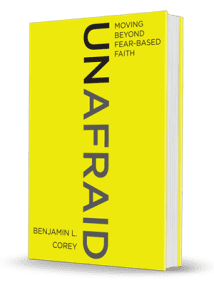If you grew up in Evangelicalism/Fundamentalism, you probably grew up with a doom-and-gloom view of the future and “end times.”
Me? I grew up with the whole deal: raptures, tribulations, the Antichrist, and even warnings that those things we first called “barcodes” might actually be the mark of the beast.
End times belief is so much more than an area of theology. It is a complex world-view that shapes every single aspect of our faith and the way we see the world, whether we’re able to recognize it or not.
The book of Revelation– the last book in the Bible– is perhaps the most complex book in Scripture. It is also in this obscure and highly symbolic book that much of the doom-and-gloom end times world-view is planted and watered.
There’s just one problem with building an entire world-view off the book of Revelation: it is a book that is notoriously difficult to understand or interpret. While it would be impossible for anyone to truly understand the book without sitting down for an interview with the author, John, there are some things we do know about it. In light of the few things we know for certain, here are a few corrections to things we were mistakenly taught to believe about the book of Revelation:
The Book of Revelation is not about the “end times.”
John’s Revelation was not something intended to be put in a time capsule and opened 2000 years later. Instead, it was a letter written to very specific churches and was addressing imminent events that directly impacted the people it was written to. John repeatedly uses terms like “soon”, “quickly” and “shortly” in reference to his prophesy– he goes out of his way to make it clear that he is writing about soon-to-happen-events, not ones distant in the future.
Simplified version: It was a letter written by one man to a handful of churches about imminent matters that were relevant to them. For us, this means that Revelation is mostly a book about past events.
Revelation is not a fear-based book of doom-and-gloom.
The book of Revelation isn’t a doom-and-gloom book at all, but rather is a very specific genre of Jewish literature where the main goal is to encourage the readers. Any interpretation that falls outside of encouraging the specific recipients of the letter, is an interpretation that is inconsistent with this literary genre.
It is a letter from one person to a handful of churches, addressing imminent events, and the entire purpose is to encourage them in the midst of these events.
The book of Revelation does not teach a secret “rapture” of the Church.
If I could count the times someone has told me to go back to Revelation to read about the rapture, the number would be considerable. The reality is however, that Revelation doesn’t teach in a rapture at all. It’s simply not in the book. (It’s not even in the Bible.)
Those who believe in the rapture will argue that it’s “implied”, since the Church is only discussed in the first part of the book, but that’s silly. We can’t just make stuff up, but when we say that Revelation teaches the rapture we actually *are* just making stuff up. Rapture theology wasn’t developed for another 1500 years after John wrote this letter.
(Same is true for the Anti-christ, which is a figure from the earlier letters from John and is not in Revelation.)
No one knows exactly what all if it means, and if they claim to, they’re lying.
Since Revelation is apocalyptic literature, it is by nature massively symbolic. Throughout the book we find symbols, numbers, and all sorts of other interesting stuff. While some of it can have an obvious meaning because of themes in the rest of Scripture (such as a symbolic lamb, which is obviously Jesus), much of what is found in this book has been endlessly debated with no clear way to determine a “correct” interpretation.
The reality is that without the ability to travel back in time and talk to the author who wrote it, and the recipients of this letter, we’ll never know the full and correct meaning of everything. While this doesn’t mean we shouldn’t try, it does mean you should be ultra skeptical of end-times preachers who claim to have it down to a science.
…
The book of Revelation is certainly interesting and filled with wonderful lessons to be gleaned, but it is notoriously misunderstood. It is not a book about the “end times.” It does not hold more news than your local newspaper, and it has very little to do with the future.
Instead, it’s a letter John wrote to several churches when he was exiled on Patmos. It was a letter he wrote in the Jewish apocalyptic genre, which was intended to foretell events to immediately occur, and which was designed to encourage those churches as they experienced the turbulent times of the mid first century.
The book of Revelation is a lot of things– but it’s not what your childhood pastor told you it was.
 Dr. Benjamin L. Corey is a public theologian and cultural anthropologist who is a two-time graduate of Gordon-Conwell Theological Seminary with graduate degrees in the fields of Theology and International Culture, and holds a doctorate in Intercultural Studies from Fuller Theological Seminary. He is also the author of the new book, Unafraid: Moving Beyond Fear-Based Faith, which is available wherever good books are sold. www.Unafraid-book.com.
Dr. Benjamin L. Corey is a public theologian and cultural anthropologist who is a two-time graduate of Gordon-Conwell Theological Seminary with graduate degrees in the fields of Theology and International Culture, and holds a doctorate in Intercultural Studies from Fuller Theological Seminary. He is also the author of the new book, Unafraid: Moving Beyond Fear-Based Faith, which is available wherever good books are sold. www.Unafraid-book.com.
Be sure to check out his new blog, right here, and follow on Facebook:

















